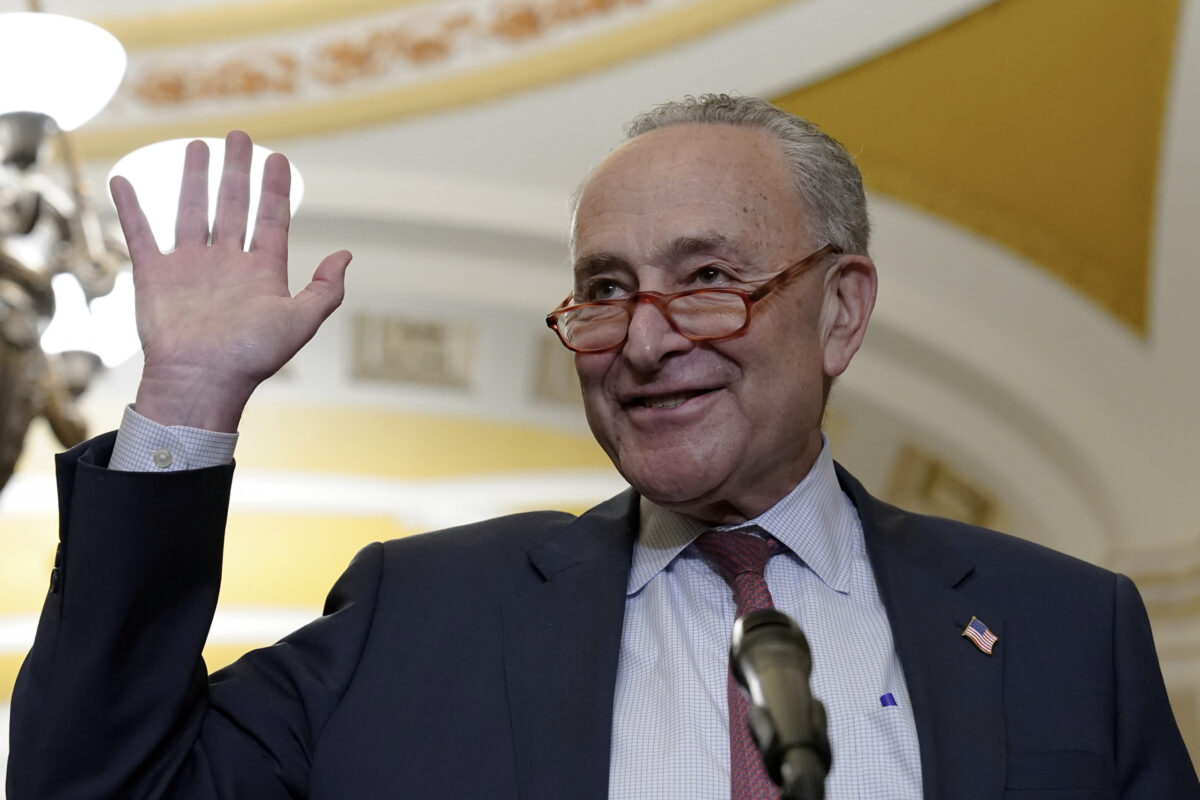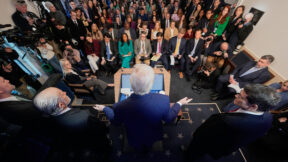CNN’s Manu Raju Confronts Schumer About His Abysmal 17% Approval: ‘Are You Concerned That You May Be a Liability for Your Party?’

AP Photo/Mariam Zuhaib
CNN chief congressional correspondent Manu Raju confronted Senate Minority Leader Chuck Schumer (D-NY) about his 17% approval rating during a press conference Tuesday, and the senator shrugged off the question and insisted the Democratic Party was united.
Schumer was delivering remarks to mark President Donald Trump’s first 100 days in office for his second term, which Schumer called “100 days of chaos.”
When Schumer took questions from gathered reporters, Raju asked him about a new CNN poll that was released early Tuesday morning, in which the senator had a 17% favorable and 44% unfavorable rating.
The poll was conducted online and via telephone interviews from April 17 to 24 of 1,678 U.S. adults with a margin of error of +/- 2.9 percentage points.
According to CNN, Schumer’s favorability rating was “his worst rating in CNN polling back to 2017.” He has been facing growing criticism as Trump’s second term has progressed, with Democratic voters frustrated with congressional Democrats, especially party leadership, and their response to the president’s aggressive agenda. When Schumer was asked in a recent CNN interview how Senate Democrats were responding to Trump pulling the funding from Harvard, he replied, “We sent him a very strong letter” — an answer that drew sharp anger as well as mockery.
House Minority Leader Hakeem Jeffries (D-NY) was also underwater in favorability in this latest CNN poll, although his numbers were not quite so dire as his Senate counterpart’s: 20% favorable and 27% unfavorable.
Schumer’s plummeting numbers have largely come from his own voters, with Democrats and Democrat-leaning independents rating him 46% favorable/11% unfavorable in January and 31% favorable/30% unfavorable in April. The numbers are especially brutal among younger Democrats:
Although he has lost ground across the board, Schumer’s unpopularity within the party is notably high among the youngest Democratic-aligned adults, as he faces significant pressure to make way for younger leaders — particularly in the wake of his decision not to fight a GOP-backed spending bill in March. Among Democrats and Democratic-leaning independents younger than 35, 14% have a favorable view and 24% an unfavorable one. Among those in the party aged 65 or older, though, impressions are widely net positive, 52% favorable to 22% unfavorable. In January, Democratic views of Schumer broke at least narrowly positive across all age groups.
The 74-year-old senator, who was first elected to Congress in 1980, seemed unfazed when Raju asked him about these poll numbers.
“There was a poll out today that has your approval rating lower than any other congressional leader, at 17 percent,” said Raju. “Are you concerned that you may be a liability for your party?”
“Polls come and go,” Schumer replied. “Our party is united. We’re on our front foot. We’re stepping forward and going after Trump, and having real success.”
A Pew Research Center poll also released on Tuesday showed that Democrats very strongly support elected Democrats fighting back against Trump’s policies, but are largely unsatisfied with their efforts thus far. Meanwhile, Democratic National Committee Vice Chair David Hogg has vowed to spend $20 million with a separate organization to support primary challenges to incumbent Democrats, setting off a bitter dispute within party ranks and a looming battle over DNC rules.
Sen. Bernie Sanders (I-VT), who has repeatedly failed to win the Democratic presidential primary nomination, and Rep. Alexandria Ocasio-Cortez (D-NY), passed over for committee chair in favor of septuagenarian Rep. Gerry Connolly (D-VA), have been traveling the country with their “Fighting Oligarchy” tour, drawing large crowds of enthusiastic progressives.
New: The Mediaite One-Sheet "Newsletter of Newsletters"
Your daily summary and analysis of what the many, many media newsletters are saying and reporting. Subscribe now!






Comments
↓ Scroll down for comments ↓